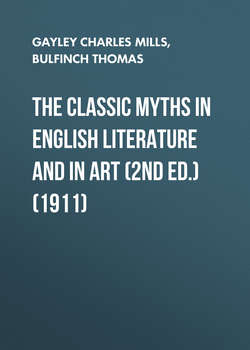Читать книгу The Classic Myths in English Literature and in Art (2nd ed.) (1911) - Bulfinch Thomas - Страница 9
PART I
MYTHS OF DIVINITIES AND HEROES
CHAPTER V
THE GODS OF THE WATERS 57
ОглавлениеFig. 40. Poseidon
50. The Older Dynasty. There were two dynasties of the sea. The Older, which flourished during the rule of Cronus, was founded by the Titans, Oceanus and Tethys, from whom sprang three thousand rivers and ocean-nymphs unnumbered. The palace of Oceanus was beyond the limits of the bountiful earth,58 surrounded by gardens and all things fair. From ages immemorial another dweller in the glimmering caves of Ocean was Pontus (the deep sea or the waterway), who became, by Mother Earth, father of Nereus. This Nereus, a genial old man of the sea, was distinguished for his prophetic gifts, his knowledge, his love of truth and justice. Taking to wife one of the daughters of Oceanus, the nymph Doris, he was blessed with a family of fifty fair daughters, the Nereïds.59 Of these daughters the most famous are Panope, Galatea, Thetis, and Amphitrite; the last of whom gave her hand to Neptune (Poseidon), brother of Jove, and thus united the Older and the Younger dynasties of the sea.
51. Of the Younger Dynasty of the waters Neptune and Amphitrite were the founders. Neptune's palace was in the depths of the sea, near Ægæ in Eubœa; but he made his home on Olympus when he chose. The symbol of his power was the trident, or three-pronged spear, with which he could shatter rocks, call forth or subdue storms, and shake the shores of earth. He created the horse and was the patron of horse races. His own steeds were brazen-hoofed and golden-maned. They drew his chariot over the sea, which became smooth before him, while dolphins and other monsters of the deep gamboled about his path. In his honor black and white bulls, white boars, and rams were sacrificed.
Fig. 41. Wedding of Poseidon and Amphitrite
52. The Lesser Divinities of the Waters60 were:
1. Triton, the son of Neptune and Amphitrite, trumpeter of Ocean. By his blast on the sea-shell he stirred or allayed the waves.
2. Proteus, an attendant and, according to certain traditions, a son of Neptune. Like Nereus, he was a little old man of the sea. He possessed the prophetic gift and the power of changing his shape at will.
3. The Harpies, foul creatures, with heads of maidens, bodies, wings, and claws of birds, and faces pale with hunger. They are the offspring of Thaumas, a son of Pontus and Gæa.
4. The uncanny offspring of Phorcys and Ceto, – children of Pontus, – who rejoiced in the horrors of the sea:
a. The Grææ, three hoary witches, with one eye between them which they used in turn.
b. The Gorgons, whose glance was icy death.
c. The Sirens, muses of the sea and of death, who by their sweet singing enticed seafarers to destruction.
d. Scylla, also destructive to mariners, a six-headed monster whose lower limbs were serpents and ever-barking dogs.
Fig. 42. Triton carrying off a Nymph
5. Atlas, who stood in the far west, bearing on his shoulders the vault of heaven. He was once regarded as a divinity of the sea, but later as a mountain. He was the son of Iapetus and the father of three classes of nymphs, – the Pleiads, the Hyads, and, according to some stories, the Hesperids. The last-mentioned, assisted by their mother Hesperis and a dragon, guarded the golden apples of the tree that had sprung up to grace the wedding of Jove and Juno. The daughters of Atlas were not themselves divinities of the sea.
6. The Water-Nymphs. Beside the Oceanids and the Nereïds, who have already been mentioned, of most importance were the Naiads, daughters of Jupiter. They presided over brooks and fountains. Other lesser powers of the Ocean were Glaucus, Leucothea, and Melicertes, of whom more is said in another section.
In the following statement of the difference between ancient and modern conceptions of nature, the poet lends new charm to the fabled rulers of the sea.
The world is too much with us; late and soon,
Getting and spending, we lay waste our powers:
Little we see in Nature that is ours;
We have given our hearts away, a sordid boon!
This sea that bares her bosom to the moon;
The winds that will be howling at all hours,
And are upgathered now like sleeping flowers;
For this, for everything, we are out of tune;
It moves us not. – Great God! I'd rather be
A Pagan suckled in a creed outworn;
So might I, standing on this pleasant lea,
Have glimpses that would make me less forlorn;
Have sight of Proteus rising from the sea;
Or hear old Triton blow his wreathèd horn.61
58
Iliad, 14, 303.
59
Iliad, 18, 30-50.
60
For genealogical table, see Commentary.
61
Wordsworth, Miscellaneous Sonnets.
